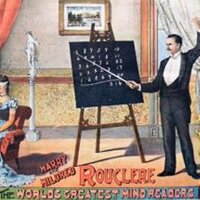Wendy Grossman looks back on change, in her 50th column for tpm
 One of the problems with skepticism is that you’re typically not in charge of your own agenda: you spend much of your time reacting to the claims other people make. This is often discussed in skeptical circles with some dismay. In this country, Richard Wiseman and Ben Goldacre have both done a good job of up-ending this situation and setting the pace for their own work.
One of the problems with skepticism is that you’re typically not in charge of your own agenda: you spend much of your time reacting to the claims other people make. This is often discussed in skeptical circles with some dismay. In this country, Richard Wiseman and Ben Goldacre have both done a good job of up-ending this situation and setting the pace for their own work.
Around the turn of the millennium, a change set in. Perhaps many others, like me, had gotten bored with continuously cycling through the same topics like a hamster trapped on a wheel: astrology, graphology, ESP, telekinesis, psychics, ghosts, UFOs, and the occasional health claim. Homeopathy came up the most often, but there were and are always plenty of quack remedies to write about.
About 1998, The Skeptic magazine’s second editors, Steve Donnelly and Toby Howard, wanted to hand the magazine on, and I began my second stint as editor while trying to find a replacement (Chris French and a string of assistant editors took over in 2000 and continue to do a fine job). At that point it seemed to me that we couldn’t go on the way we had been. Michael Shermer with his LA-based The Skeptic was already beginning to branch out, and it seemed clear to several of us that our The Skeptic needed to go the same way. We needed, we thought, to cover topics whose science was unclear, even controversial. Modern topics, like GM foods, climate change (we still called it global warming back then), the link, if any, between mobile phone use and brain cancer. Like that.
It turned out we were part of a general move throughout the skeptical world to broaden our horizons. One reason was clearly the political regime in the US in the 2000s. Before Bush II it was possible to be skeptical without being political; but contempt for science and reason was so endemic in Bush’s administration that it was impossible to remain that way. This fact was, I believe, part of the reason the US-based Committee for Scientific Investigation of Claims of the Paranormal (the cleverly named CSICOP) changed its name to the Center for Scientific Inquiry; its remit had to expand to cover politics, science, and even some religious activism (particularly in the area of creationism in the schools).
The change has probably kept a lot of skeptics from burning out: the boredom of repetition really is the enemy in this particular business. For one thing, it’s bad for the soul. For another, it’s not a good way to advertise a habit of thinking. Plus, it’s boring.
But the reason it’s such a danger is that probably the most significant difference between science and pseudoscience is that pseudoscience does not advance. What is there that’s new to say about astrology? As a practice it has barely changed in the last 2,000 years. Oh, sure, there are new studies once in a while. But they don’t change the ball game. The discovery (and recent relegation) of Pluto made no difference to star charts. Astronomers had long predicted the existence of a planetary body in Pluto’s spot because they could see the gravitational pull on the planetary orbits they were studying. Astrologers never once said, gee, there’s a missing influence here that we can’t see but must be present.
The same goes for homeopathy, chiropractic, creationism, or ESP: little within those belief systems has changed materially in the 23 years The Skeptic has been in business (see our new anthology from the first 21 of those years, Why Statues Weep). Even UFOs and ghosts: new cases pop up from time to time, but none ever provides conclusive evidence of anything. We never get, as I said nearly 15 years ago to John Stapleton on The Time, The Place, to the point where an alien spacecraft – not unidentified – lands on the roof of Buckingham Palace and we stop arguing about whether it’s really an alien spacecraft and instead have debates about who ought to pay for the damage.
Covering controversial science is, of course, harder. For one thing, you’re covering topics where you, like everyone else, genuinely don’t know what conclusion scientific consensus will eventually reach or how it will be applied. Sometimes there’s good and bad science on both sides, such as the debates over GM foods. In some areas, like climate change, we have the added problem that “skeptic” denotes deniers who insist it isn’t happening; that’s not us.
In any case, it looks as if we’ll have plenty of material for the next 23 years.
Wendy M Grossman is founder and former editor (twice) of The Skeptic magazine and co-editor of Why Statues Weep, an anthology of the best from the first 21 years of The Skeptic
 Email This Post
Email This Post 



Astrology, graphology, ESP, telekinesis, psychics, ghosts, UFOs? I would never have guessed skeptics deal with such topics. The work you do sounds like it’s geared towards the average person on the street. If so, why? Are you going to argue against ghosts every time someone believes they’ve seen one? Surely, skepticism is still a member of the family of philosophies. If I can understand, perfectly, what its all about, it can’t be very good philosophy.
Science is a topic more suited to what skepticism should be considering. Its difficulty I would say, besides what you suggest, is its language. Arguing with a scientist leaves one open to appearing ill informed no matter how informed you might be as a non-scientist. It’s a good cover. Of the sciences, cosmology I should think is the most vulnerable to skepticism. Every time there’s a new empirical discovery it almost always contradicts what had previously been believed. The whole field is covered with scotch tape ready to bust loose at any time.
Also, pharmaceutical claims are ripe for some good poking around. I’ll even give you an excellent place to start: cholesterol and statins.
[...] a movement nearly 25 years ago, her talk was inevitably biased in favour of her success in founding The Skeptic, the magazine. Fair enough, methinks. However, I did wonder at her reluctance back then to be [...]